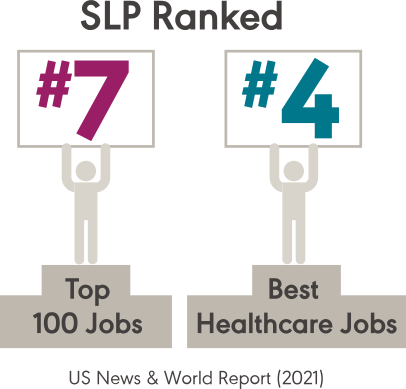One Discipline. Two Professions.
LEARN MORE ABOUT SPEECH-LANGUAGE PATHOLOGY
Now you know what CSD is—but what exactly do speech-language pathologists do? What training do they need? Learn answers to these questions and more below—and learn how an exciting career in speech-language pathology may be the right path for you.
SPEECH-LANGUAGE PATHOLOGY
Employment of speech-language pathologists is projected to grow 29% from 2020 to 2030, much faster than the average for all occupations.

What are speech-language pathologists, and what do they do?
Speech-language pathologists (SLPs) work with people on speech and language—but also on so much more. SLPs work with people throughout the lifespan, and they do everything from helping people recover after traumatic brain injuries to helping autistic people improve their social communication skills. They may specialize in any of the following areas:
- speech disorders—including articulation problems, fluency (e.g., stuttering) disorders, and voice problems
- language disorders—including receptive/expressive language, spoken and written language, and social/pragmatic language
- gender affirming voice services
- swallowing disorders—including pediatric and adult feeding disorders
- cognitive disorders—including dementia
Where do SLPs work?
Some SLPs work in infant and toddler programs, preschools, and elementary and secondary schools, whereas some are employed in health care settings, in private practice, or even teaching, conducting research, and supervising students in college and university clinics.
As an SLP, you could be engaging in any of the following roles:
- providing parent education and training to help language development in toddlers
- providing language therapy to help children follow directions and answer questions
- diagnosing and treating patients who have difficulty communicating because of brain injury and/or swallowing problems
- making new discoveries about speech, language, and swallowing disorders
- teaching courses and mentoring students in research, teaching, and clinical practice
- distinguishing language differences from language disorders in users of multiple languages and in users of English dialects
- adapting or developing assessments and materials for multilingual populations
How much could a speech-language pathologist make?
According to ASHA Member surveys, the salaries of speech-language pathologists vary depending on education, experience, work setting, and geographical location, with median salaries ranging from $66,000 in school settings to $78,000 in health care settings to $100,000 for administrators and supervisors.
What education do I need to become an SLP?
A master’s degree (e.g., MA or MS) is required to work independently as an SLP.
- A master’s degree in speech-language pathology requires approximately 2 years of full-time study.
- Degree requirements include both academic coursework and clinical practicum experiences.
Find out more information about speech-language pathology careers.